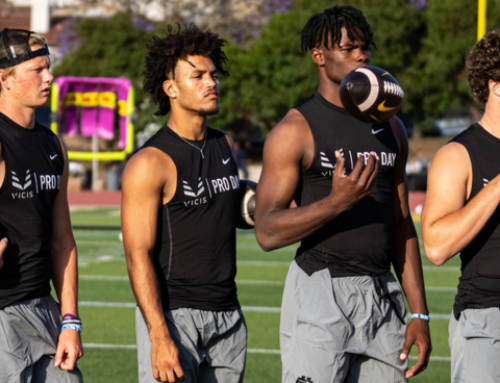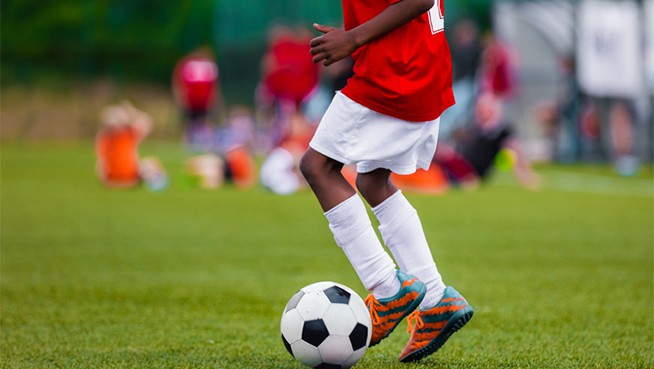Dwight Freeney Hates When Kids Only Play One Sport
Dwight Freeney isn’t a fan of specializing in one sport too soon.
In a new article for The Player’s Tribune, the five-time All-Pro revealed he actually first tried football when he was in fifth grade, only to quit after his coaches made him play offensive line. But Freeney doesn’t regret that for a second, as he picked up soccer after quitting football. He would eventually give football a second chance once he reached high school, but Freeney believes playing a combo of soccer, baseball and basketball as an adolescent helped him develop the athleticism to become a terrorizing defensive end. From Freeney:
So I quit football and went and played soccer. That’s where I get my footwork from—the soccer field. I get my hand-eye coordination from playing baseball my whole life. Shoot, even the move on the football field I’m most known for—my spin move—originated on the basketball court. I used to play power forward in high school, and when I would get the ball in the post, I would do a drop step and spin around the defender to the basket. It was my go-to move. I got called a lot for traveling, but I also got a lot of buckets. I developed almost every skill that makes me a great pass rusher by playing another sport. And without those skills, I would never have made it to the NFL, let alone play for 15 years.
Freeney’s remarks mesh with what we’ve been hearing from many pro athletes. NFL players have been especially passionate about this topic. Superstars like J.J. Watt, Drew Brees and Christian McCaffrey have all told STACK they believe playing multiple sports during their upbringing was crucial to their development. Eighty-eight percent of the players selected in the 2017 NFL Draft played multiple sports in high school. In a recent study, just 22.3% of professional athletes said they “would want their own child to specialize to play a single sport during childhood/adolescence.” Playing different sports teaches your body to move in different ways and reinforces competitiveness. It also can reduces your chance of suffering a sports-related injury.
“It always bugs me when I hear about parents who limit their kids to playing only one sport. ‘Specializing,’ as they call it. I don’t believe in all that—at least not at a young age. Let the kids play whatever they want. Let them become athletes,” Freeney writes.
You don’t have to be a modern day Bo Jackson to reap the benefits of being a multi-sport athlete. Saquon Barkley, the best running back in college football today, also played basketball in high school (in addition to running track). Barkley averaged just 4.2 points per game, but basketball helped him build athleticism and competitiveness. “I’ll be honest, I’m not a great, all-around basketball player but I try to hustle and bring energy to the team,” Barkley told The Morning Call.
Youth sports have become increasingly expensive over the years, but the benefits of playing multiple sports are immense. None of these athletes are advocating joining elite travel teams for three or four different sports—they simply want kids to have the chance to compete in various athletics, whatever form that might take. Playing just one sport from an early age can also limit your opportunities. Allen Iverson thought he was the “greatest football player God ever created.” Russell Wilson’s first love was baseball. J.J. Watt once dreamed of playing in the NHL. Would we even know these guys’ names today if they hadn’t branched out to different sports?
Photo Credit: Peter G. Aiken/Getty Images
READ MORE:
RECOMMENDED FOR YOU
MOST POPULAR
Dwight Freeney Hates When Kids Only Play One Sport
Dwight Freeney isn’t a fan of specializing in one sport too soon.
In a new article for The Player’s Tribune, the five-time All-Pro revealed he actually first tried football when he was in fifth grade, only to quit after his coaches made him play offensive line. But Freeney doesn’t regret that for a second, as he picked up soccer after quitting football. He would eventually give football a second chance once he reached high school, but Freeney believes playing a combo of soccer, baseball and basketball as an adolescent helped him develop the athleticism to become a terrorizing defensive end. From Freeney:
So I quit football and went and played soccer. That’s where I get my footwork from—the soccer field. I get my hand-eye coordination from playing baseball my whole life. Shoot, even the move on the football field I’m most known for—my spin move—originated on the basketball court. I used to play power forward in high school, and when I would get the ball in the post, I would do a drop step and spin around the defender to the basket. It was my go-to move. I got called a lot for traveling, but I also got a lot of buckets. I developed almost every skill that makes me a great pass rusher by playing another sport. And without those skills, I would never have made it to the NFL, let alone play for 15 years.
Freeney’s remarks mesh with what we’ve been hearing from many pro athletes. NFL players have been especially passionate about this topic. Superstars like J.J. Watt, Drew Brees and Christian McCaffrey have all told STACK they believe playing multiple sports during their upbringing was crucial to their development. Eighty-eight percent of the players selected in the 2017 NFL Draft played multiple sports in high school. In a recent study, just 22.3% of professional athletes said they “would want their own child to specialize to play a single sport during childhood/adolescence.” Playing different sports teaches your body to move in different ways and reinforces competitiveness. It also can reduces your chance of suffering a sports-related injury.
“It always bugs me when I hear about parents who limit their kids to playing only one sport. ‘Specializing,’ as they call it. I don’t believe in all that—at least not at a young age. Let the kids play whatever they want. Let them become athletes,” Freeney writes.
You don’t have to be a modern day Bo Jackson to reap the benefits of being a multi-sport athlete. Saquon Barkley, the best running back in college football today, also played basketball in high school (in addition to running track). Barkley averaged just 4.2 points per game, but basketball helped him build athleticism and competitiveness. “I’ll be honest, I’m not a great, all-around basketball player but I try to hustle and bring energy to the team,” Barkley told The Morning Call.
Youth sports have become increasingly expensive over the years, but the benefits of playing multiple sports are immense. None of these athletes are advocating joining elite travel teams for three or four different sports—they simply want kids to have the chance to compete in various athletics, whatever form that might take. Playing just one sport from an early age can also limit your opportunities. Allen Iverson thought he was the “greatest football player God ever created.” Russell Wilson’s first love was baseball. J.J. Watt once dreamed of playing in the NHL. Would we even know these guys’ names today if they hadn’t branched out to different sports?
Photo Credit: Peter G. Aiken/Getty Images
READ MORE:











